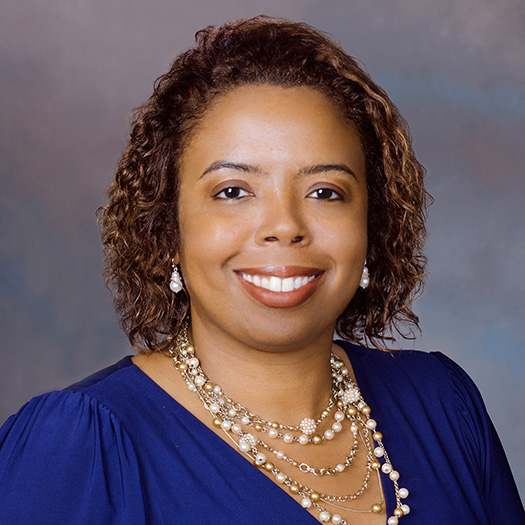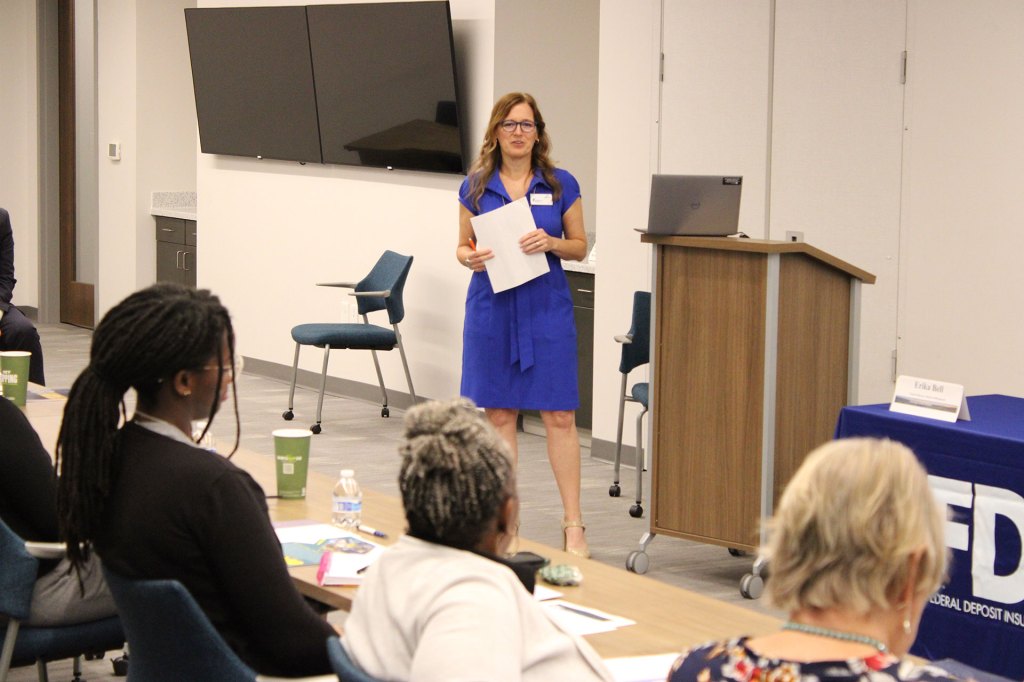Jessica LeVeen Farr, Bank Examiner, Atlanta Fed, with her family at the Grand Canyon.
Jessica LeVeen Farr wants people to know many things about the Community Reinvestment Act (CRA). She also wants those with planning and community development (CD) interests to recognize that a career path as a CRA examiner is one worth considering.
“I believe as the CRA evolves, we need people who really believe in community development to see the examiner track as a career choice,” she says. With over two decades of experience at the Fed and at financial institutions in community development and bank examinations focused on CRA, her career proves it.
The CRA was one of several laws enacted in the 1960s and 1970s to address fairness and financial inclusion in access to housing and credit, including the discriminatory practice known as “redlining.” The CRA requires the three banking regulatory agencies—the Federal Deposit Insurance Corporation (FDIC), the Federal Reserve Board, and the Office of Comptroller of the Currency (OCC)—to assess a bank’s record of meeting the credit needs of its entire community, including low-and moderate-income neighborhoods, consistent with safe and sound operations. The statute further requires the agencies to prepare a written evaluation of a bank’s CRA record, and take that record into account when evaluating an application for a deposit facility by the bank. The agencies have jointly issued CRA regulations that establish the framework and criteria by which the agencies assess a bank’s CRA performance.
On October 24, 2023, the three agencies released a final rule that significantly updates the CRA regulations for the first time since 1995. Among other objectives, the new rule is intended to adapt to changes in the banking industry (including the expanded role of mobile and online banking), provide greater clarity and consistency in the application of the regulations, and strengthen the achievement of the CRA’s core purposes. With her CD experience and CRA knowledge, Jessica has contributed significantly to these updates.
Pursuing community development interests
Jessica had a strong interest in community development and city planning as she pursued an undergraduate degree in urban studies and graduate degree in urban planning. Between college and graduate school, she worked for a consulting firm focused on the economics of land use planning. After graduate school, she moved to Nashville, TN and worked at a large financial institution that at the time was developing single-family and multi-family housing through their own community development corporation. Most were developed by primarily doing tax-credit deals. The bank also developed single-family homes on vacant, underused lots in established neighborhoods. “I was responsible for developing the single-family housing, in partnership with nonprofits,” Jessica said. “I actually never intended to be involved in anything dealing with financial services or banks.”
Jessica later applied for a position in the Community Affairs department at the Atlanta Fed after learning more about the work of the department from the community affairs staff person in Nashville. “I thought it was a great fit,” she said. “It aligned with my interest in community development and policy, but also allowed me to leverage the experience that I had working at the bank.”

“It’s important to have people with a passion for community development serving on the CRA exam side so we can help banks think about how their activities can be more impactful.”
Combining regulatory experience and practical community development expertise
As the Atlanta Fed’s community development manager for Tennessee, Jessica was involved in outreach with financial institutions, local nonprofits, and government organizations. She focused on affordable housing, community development finance, small businesses, and financial stability initiatives. At the time Jessica was hired, the Community Affairs department was part of the Atlanta Fed’s Supervision and Regulation division. Most members of the Community Affairs team, including Jessica, were required to go through the extensive training program to become commissioned examiners. This program involves intensive training to help examiners receive the knowledge required to keep pace with recent and expected changes in the banking industry.
When the Community Affairs program restructured and moved into the Research Division, Jessica’s manager remained in Supervision and Regulation. A couple years later, her former manager approached her about returning to Supervision and Regulation to focus on CRA. According to Jessica, Atlanta had some of the largest state member banks, and these banks had sophisticated CRA programs. Her manager indicated that it would be beneficial for the supervision of these institutions to have a dedicated CRA examiner team that had expertise in community development. She was asked to develop a new team that would focus primarily on the community development components in large bank CRA examinations.
“One of the challenges with the CRA is that examiners usually don’t have a background in community development. They have a background in compliance regulations,” Jessica said. In addition to having knowledge of community development, she noted, “I firmly believe it’s important to have people with a passion for community development serving on the CRA exam side so we can help banks think about how their activities can be more impactful.”
Working across agencies and teams on modernization
Since 2019, Jessica has spent most of her time working with the Federal Reserve Board of Governors on CRA modernization. “We were a small group, so everyone ended up touching some part of updates to the regulation,” Jessica said.
Jessica said that the new CRA rule will offer opportunities for bank examiners and CD across the Federal Reserve Bank System. It can also leverage work she participated in several years ago led by the Federal Reserve Board to assess how CD and consumer compliance across the Reserve Banks can collaborate more intentionally.
“We identified a lot of opportunities, including setting regular touch points and meetings, sharing what’s happening in local communities, training, leveraging CD staff to help examiners to better understand credit and community development needs in local communities, and identifying good community contacts,” she said. “There is a strong interest in how we can better leverage CD expertise and how we can have CD more tightly aligned with CRA’s implementation going forward.”
Looking ahead to implementation
There’s still much to do to make sure that regulators, community organizations, and financial institutions are ready. Jessica is excited about the possibilities for all involved. She believes that the new CRA rule will provide more transparency in evaluations of financial institutions while increasing lending and investment opportunities in lower-income communities.
“By having a more standardized approach for how we evaluate impactful activities, I hope that CRA will not just focus on volume of activities, but will focus on impact,” Jessica says. “With CRA modernization, I believe we’ve struck a good balance of providing metrics and providing greater clarity and consistency while still recognizing the importance of impact and responsiveness to community credit needs.”





